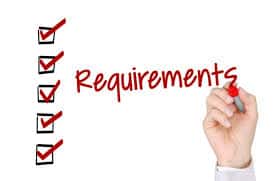What Are Non-Medical Requirements for Disability? To receive Social Security disability insurance benefits (SSDI) or Supplemental Security Income benefits (SSI) you must meet both medical and non-medical requirements. Typically, Social Security will make sure you meet the non-medical requirements before looking at the medical requirements.
General Non-Medical Requirements for Disability
The non-medical requirements for disability include any criteria not related to your medical or mental health conditions. This includes your proof of age. Generally, you can use your birth certificate as proof of age. Social Security will also ask you questions about your marital status and children.
Non-Medical Requirements for Disability and Work Status
Additionally, Social Security will also need to confirm that you are no longer working. Social Security defines disability as having medical conditions that keep you from working. Your conditions must keep you from working for at least 12 months. Therefore, if you are still working full time or are out of work for less than 12 months, you would not qualify for Social Security disability benefits.
Non-Medical Requirements for SSDI
In order to qualify for SSDI benefits, you need to have worked a certain number of years. Any worker with a valid Social Security number who paid into Social Security may file for SSDI benefits. Social Security keeps track of your earnings and work credits. You receive work credits each year that you work and pay taxes. Generally, you need at least 20 work credits to qualify for Social Security disability benefits.
Non-Medical Requirements: SSDI Work Credits
Social Security disability work credits expire after a certain amount of time after you stop working. Your date last insured (DLI) is the last date you can qualify for SSDI benefits. Usually, your DLI covers five years after you stop working. However, your coverage may end in less than five years if your earnings were low. Your coverage may also be limited if your work was inconsistent.
Example : SSDI work credits
As an example, say you stopped working in June 2019. You worked consistently for the past 12 years. Your date last insured would expire around June 2024. Therefore, you are currently eligible to file for Social Security disability benefits.
Non-Medical Requirements: Expired DLI
You can still apply and qualify for SSDI benefits if your DLI has expired. However, you must prove that you were disabled before your DLI expired. Sometimes, this can be very difficult. The longer you wait to file for SSDI after your DLI expired, the harder it can be to prove your case.
Example: SSDI expired DLI
For example, Donna stopped working in June 2013 when her fibromyalgia symptoms became worse. She did not file for Social Security benefits until December 2019. Her DLI expired in June 2018. Donna must have medical evidence showing that her condition prevented her from working before June 2018.
Non-Medical Requirements for SSI
Supplemental Security Income is a financial needs-based program. To qualify for SSI, Social Security considers your income, assets and resources. Unlike SSDI, you do not need to have worked or earn any work credits. Both children and adults can file for SSI. However, Social Security looks at the income of the parents for children’s SSI eligibility.
What are the Financial Requirements for SSI?
SSI benefits have a very strict set of financial requirements. It is considered a “means-tested” benefit. To meet the SSI income requirements,
- You must have less than $2,000 in assets (or $3,000 for a couple)
- Have a very limited income
- Are a US citizen (there are very few exceptions to this)
Can You File for Both SSDI and SSI?
In some cases, you can file for both SSDI and SSI. You may have earned enough credits for SSDI. You may also meet the financial requirements for SSI. Filing for both SSDI and SSI is referred to as filing for “concurrent benefits.” However, to receive concurrent benefits, you must be approved medically for SSDI but receive low monthly payments.
Example: non-medical requirements for SSDI and SSI
For example, you have worked consistently in the past. Unfortunately, you have had to stop working due to your medical conditions. Now that you are no longer working, your income is very limited. You may have to apply for state assistance or file for SSDI/SSI or rely on others for financial help.
Technical Denials
If you do not meet the non-medical requirements for disability, you will receive a technical denial. Social Security will send you notice of a technical denial pretty quickly. You cannot appeal a technical denial.
Medical Requirements for Disability
If you meet the non-medical requirements for disability, Social Security evaluates the medical requirements. Your claim will be sent to Disability Determination Services (DDS.) DDS contacts your doctors for you medical records. They may schedule examinations with a Social Security consultative examiner. DDS will determine whether you are medically disabled.
Getting Help with your Disability Claim
Working with an experience advocate can be beneficial. It can help improve your chances of winning your case. Your disability advocate understands both the medical and non-medical requirements for Social Security disability claims. They can help guide you through the process.
Disability Help Group, Call Now for a Free Case Review, 800-700-0652
Make sure you start your claim the right way and apply for all the benefits you deserve. Contact us now for a free consultation.
Related Articles
- Is Osteoporosis a Disability?
- What is the Difference Between SSI and SSDI?
- I Just Received a Function Report Questionnaire from Social Security. What Should I Do?
- Why Your SSD Claim Might Be Denied?
- What is the SSDI Payment Schedule?
- How can I Check on My Disability Claim?
- Why Should I Hire a Disability Lawyer?
- What are the Over 55 Grid Rules?
- VA Benefits Appeal
- VA Disability Remand
- What are Social Security Disability Questions?







